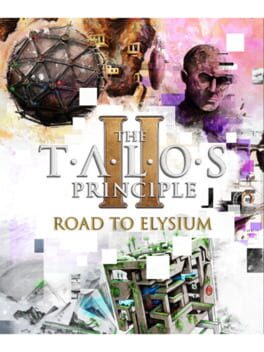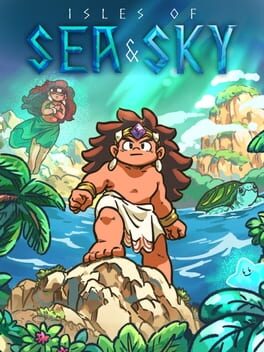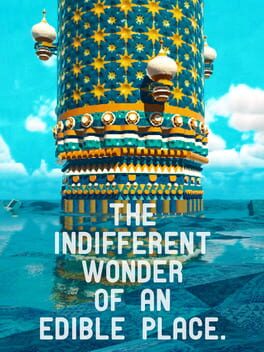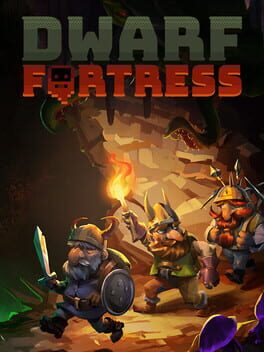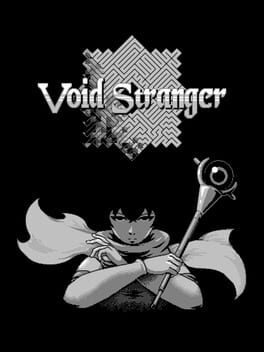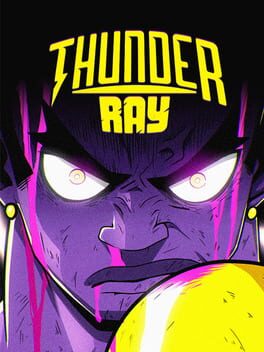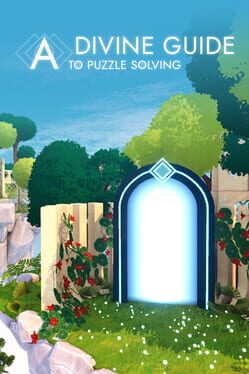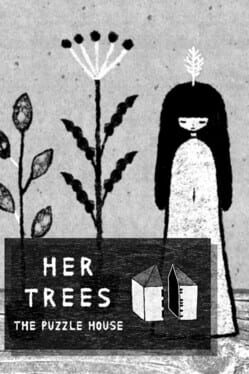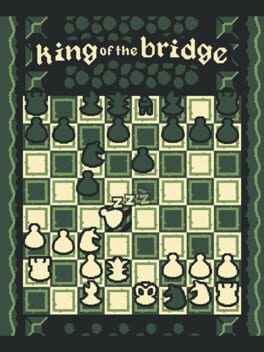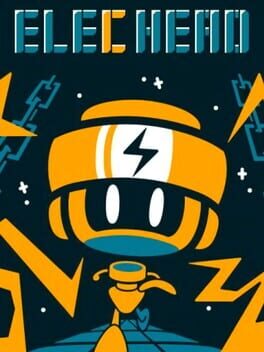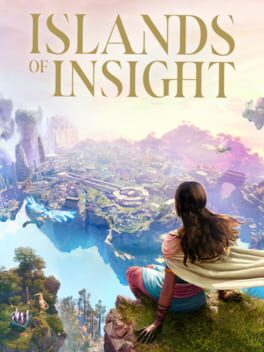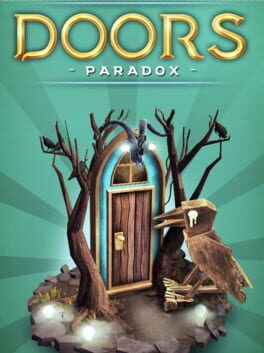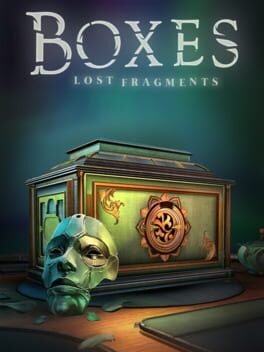NormalDream
BACKER
It's more The Talos Principle II!
If you liked the original game, you will certainly like this expansion.
The one downside is that it mostly expands a bit on the ideas of the main game in various ways (both the mechanics and philosophy), but doesn't really bring much new ones.
Still, some of these ideas bear repeating. It didn't disappoint, I had a good time!
If you liked the original game, you will certainly like this expansion.
The one downside is that it mostly expands a bit on the ideas of the main game in various ways (both the mechanics and philosophy), but doesn't really bring much new ones.
Still, some of these ideas bear repeating. It didn't disappoint, I had a good time!
2022
(contains very light spoilers)
Pure insanity.
Stephanie Sterling put it really well:
"It's like somebody told the dev team this was the last videogame that was ever going to be developed for the rest of time. So if they had any ideas, they better smoke 'em while they got 'em."
Rebirth is a game of variety. Every new areas brings its own unique mechanics and minigame. And they never feel stale, or like they are playing it safe, with completely new ideas all over the board.
Are any of these perfect? No, a lot of them are pretty janky. But even I get to a bit that's kinda "meh", I'm still so happy to see that they Really tried, all the time, everywhere.
While still following a pretty linear story, the game feels more open than Remake. With several open world areas to explore, encountered progressively through the story at infrequent intervals (here too, the game feels unpredictable).
I was initially worried that those ares would end up feeling too much like I was just going mindlessly from one point of the map the next... And I was only half right. I was at least able to grow in familiarity with each area over time, which honestly felt really nice. In that way, I do feel like the game gets a lot better if you limit your fast travels to a minimum... Here, the summon crystal are what feel the most out of place. It really feels like you're just going to some random place for the purpose of pressing a button and just moving on your way. Even with the small blurb of story you get for each summon, they end up feeling quite detached from the world and its lore.
I really like the part near the end where all the various areas end up getting connected into a single seamless open world, although it had the unfortunate effect of also making the world feel a lot smaller. You can compare that to old FF world maps which manage to keep a grounded scale, by showing the world maps in a different style than the rest of the exploration. But I don't really know how they could have implemented this and kept the full realism that FF7 Re is going for.
I also wish they did a bit more ocean exploration.
That dedication to being all over the place sometimes works against itself when it comes to telling its story. Some really serious moments get immediately juxtaposed to silly one in quite jarring ways. You have some truly evil characters also being depicted as aloof in ways that leave me confused as to how the game expects me to feel about them. And the environmental message of the game feels weird juxtaposed to the great show of playfulness that is the Golden Saucer, which is itself shown to be very destructive on the environment.
Even here though, this mess isn't all bad. The way the party jumps from adventure to adventure somewhat reminds me of old hero tales, where the idea of the story are more episodic in nature, seeing how the hero will handle this new situation they find themselves in. And FF7 Re is very much a character driven story.
And what character they are... I can honestly say that I love... most of the character of the main cast. Of the main party, there is only Yuffie that I only like instead of love, and even then, she still had scenes that touched me deeply. Outside of the main party though, I really dislike Chadley, which is unfortunate since it's one of the (if not The) biggest ally that we have outside the party.
As a final note. The game also features an amazing soundtrack. I had to stop on several occasion just to take some time and listen to the ambient music. Although I don't think this soundtrack is used super effectively, I wondered on several occasion, uh, why would they use this character's theme Here, when they don't really have any connection to this place?
Now... What comes next? Really... The whole ending chapter had me feeling all kind of ways, and I once again have no idea what will come next, and Rebirth taught me that having any kind of expectations would be pointless. So I'll just wait and see, it's going to be a long wait until the final element of the trilogy.
Pure insanity.
Stephanie Sterling put it really well:
"It's like somebody told the dev team this was the last videogame that was ever going to be developed for the rest of time. So if they had any ideas, they better smoke 'em while they got 'em."
Rebirth is a game of variety. Every new areas brings its own unique mechanics and minigame. And they never feel stale, or like they are playing it safe, with completely new ideas all over the board.
Are any of these perfect? No, a lot of them are pretty janky. But even I get to a bit that's kinda "meh", I'm still so happy to see that they Really tried, all the time, everywhere.
While still following a pretty linear story, the game feels more open than Remake. With several open world areas to explore, encountered progressively through the story at infrequent intervals (here too, the game feels unpredictable).
I was initially worried that those ares would end up feeling too much like I was just going mindlessly from one point of the map the next... And I was only half right. I was at least able to grow in familiarity with each area over time, which honestly felt really nice. In that way, I do feel like the game gets a lot better if you limit your fast travels to a minimum... Here, the summon crystal are what feel the most out of place. It really feels like you're just going to some random place for the purpose of pressing a button and just moving on your way. Even with the small blurb of story you get for each summon, they end up feeling quite detached from the world and its lore.
I really like the part near the end where all the various areas end up getting connected into a single seamless open world, although it had the unfortunate effect of also making the world feel a lot smaller. You can compare that to old FF world maps which manage to keep a grounded scale, by showing the world maps in a different style than the rest of the exploration. But I don't really know how they could have implemented this and kept the full realism that FF7 Re is going for.
I also wish they did a bit more ocean exploration.
That dedication to being all over the place sometimes works against itself when it comes to telling its story. Some really serious moments get immediately juxtaposed to silly one in quite jarring ways. You have some truly evil characters also being depicted as aloof in ways that leave me confused as to how the game expects me to feel about them. And the environmental message of the game feels weird juxtaposed to the great show of playfulness that is the Golden Saucer, which is itself shown to be very destructive on the environment.
Even here though, this mess isn't all bad. The way the party jumps from adventure to adventure somewhat reminds me of old hero tales, where the idea of the story are more episodic in nature, seeing how the hero will handle this new situation they find themselves in. And FF7 Re is very much a character driven story.
And what character they are... I can honestly say that I love... most of the character of the main cast. Of the main party, there is only Yuffie that I only like instead of love, and even then, she still had scenes that touched me deeply. Outside of the main party though, I really dislike Chadley, which is unfortunate since it's one of the (if not The) biggest ally that we have outside the party.
As a final note. The game also features an amazing soundtrack. I had to stop on several occasion just to take some time and listen to the ambient music. Although I don't think this soundtrack is used super effectively, I wondered on several occasion, uh, why would they use this character's theme Here, when they don't really have any connection to this place?
Now... What comes next? Really... The whole ending chapter had me feeling all kind of ways, and I once again have no idea what will come next, and Rebirth taught me that having any kind of expectations would be pointless. So I'll just wait and see, it's going to be a long wait until the final element of the trilogy.
2024
I enjoyed the variety of mechanics, and the way some of the puzzles seem somewhat open ended.
Unfortunately the game just feels unfinished, with a bunch of hint toward puzzles that don't yet exist. I was happy to explore the world and search for all the puzzles, but was left unsatisfied by the amount of notes I took that didn't end up mattering.
The Polynesian theme feels pretty fresh, it's just a shame the story elements feels somewhat shallow.
Unfortunately the game just feels unfinished, with a bunch of hint toward puzzles that don't yet exist. I was happy to explore the world and search for all the puzzles, but was left unsatisfied by the amount of notes I took that didn't end up mattering.
The Polynesian theme feels pretty fresh, it's just a shame the story elements feels somewhat shallow.
2022
When you hear people talking about Dwarf Fortress, you always hear about these crazy situations that can happen, with the incredible amount of details that make up the world.
What you don't hear about is that the UI/UX is sooo bad. Undertaking any kind of construction plan, managing any resource, looking up the status of your dwarves, ... Everything is pain in the butt.
Anyway, my first civilization ended with one of my dwarves getting cursed by a deity for doing who know what in its temple and turning a werelizard. It was dispatched without too much trouble, but other dwarves were bitten in the struggle. They turned at the next full moon and the chain reaction killed three quarters of my fortress. I started thinking of making plans for the next full moon (I was planning on walling off my hospital, which would have turned my werelizard problem into a ghost problem). But an ancient beast chose this time to wake, and decimated my few remaining citizens.
That's kind of a cool story I guess. But it took 20+ hours of playing to get to. A lot of it being me just staring blankly at my screen, contemplating all the annoying interface I'll have to go through to build a few more bedrooms.
If the game gets a complete overall of its UX, I'd be interested in coming back to it tho. There are some interesting systems at play here.
What you don't hear about is that the UI/UX is sooo bad. Undertaking any kind of construction plan, managing any resource, looking up the status of your dwarves, ... Everything is pain in the butt.
Anyway, my first civilization ended with one of my dwarves getting cursed by a deity for doing who know what in its temple and turning a werelizard. It was dispatched without too much trouble, but other dwarves were bitten in the struggle. They turned at the next full moon and the chain reaction killed three quarters of my fortress. I started thinking of making plans for the next full moon (I was planning on walling off my hospital, which would have turned my werelizard problem into a ghost problem). But an ancient beast chose this time to wake, and decimated my few remaining citizens.
That's kind of a cool story I guess. But it took 20+ hours of playing to get to. A lot of it being me just staring blankly at my screen, contemplating all the annoying interface I'll have to go through to build a few more bedrooms.
If the game gets a complete overall of its UX, I'd be interested in coming back to it tho. There are some interesting systems at play here.
2023
Void Stranger's approach to progression is uniquely interesting.
Here is an example:
You're just a few levels in, and encounter your first npc. Because of some tricky placement, you end up accidentally pushing that npc off a ledge. Oh no! What was that about? You reset the level. Now the npc isn't them anymore. Did you do something bad? Was that character important? Will you need to restart the game? How would you even do that, there doesn't seem to be any save file management in the menus. The game will not answer any of these questions, you will just have to move on and continue playing.
I got into these moments of confusion several times in my playthrough. And every time and I was more hooked.
This dedication to being unhelpful carries on to the puzzles of the game. The hints as to what you need to do to get different endings are few, and always very cryptic. I found this to be both frustrating, and really rewarding. Not only because it made any new discovery that much more exciting, but because it also forced me to deeply engage with the world and its stories, by scouring each piece of lore with information on what is going on.
That world is really well written and I grew attached to many of the characters.
You follow several storylines that don't end up being very deeply intertwined, but still are related to each other in interesting ways.
Similarly, even various of the mechanics of the game end up being related to elements of the story in ways that aren't completely necessary, or completely explained. But still make the world feel richer.
Not everyone will enjoy Void Stranger. But it touched me deeply, and it radically changed my perception of how videogames can approach storytelling and player progression.
Here is an example:
You're just a few levels in, and encounter your first npc. Because of some tricky placement, you end up accidentally pushing that npc off a ledge. Oh no! What was that about? You reset the level. Now the npc isn't them anymore. Did you do something bad? Was that character important? Will you need to restart the game? How would you even do that, there doesn't seem to be any save file management in the menus. The game will not answer any of these questions, you will just have to move on and continue playing.
I got into these moments of confusion several times in my playthrough. And every time and I was more hooked.
This dedication to being unhelpful carries on to the puzzles of the game. The hints as to what you need to do to get different endings are few, and always very cryptic. I found this to be both frustrating, and really rewarding. Not only because it made any new discovery that much more exciting, but because it also forced me to deeply engage with the world and its stories, by scouring each piece of lore with information on what is going on.
That world is really well written and I grew attached to many of the characters.
You follow several storylines that don't end up being very deeply intertwined, but still are related to each other in interesting ways.
Similarly, even various of the mechanics of the game end up being related to elements of the story in ways that aren't completely necessary, or completely explained. But still make the world feel richer.
Not everyone will enjoy Void Stranger. But it touched me deeply, and it radically changed my perception of how videogames can approach storytelling and player progression.
2023
The overall aesthetic is nice. But it is unfortunately janky to the point of not being enjoyable. Really bad voice acting, bad transitions and "story" between fights, enemy moves that are hard to read...
The fairly short length of the game fits quite well with the kind of game that it is. Still, even then, I got to the final boss and couldn't be bothered to beat him; watched it on youtube instead, and I don't feel like I've missed much.
The fairly short length of the game fits quite well with the kind of game that it is. Still, even then, I got to the final boss and couldn't be bothered to beat him; watched it on youtube instead, and I don't feel like I've missed much.
Nice and short, lacking a bit in substance.
Like many of these types of games, it tries to be Portal, with their own flavor of "test chambers", and its own version of GLaDOS. Fortunately for it though, unlike many of these types of game, it wasn't too obnoxiously written.
Nothing exceptional here, but if you like the genre, you won't have a bad time. And it doesn't overstay its welcome.
Like many of these types of games, it tries to be Portal, with their own flavor of "test chambers", and its own version of GLaDOS. Fortunately for it though, unlike many of these types of game, it wasn't too obnoxiously written.
Nothing exceptional here, but if you like the genre, you won't have a bad time. And it doesn't overstay its welcome.
2024
2021
A very nice little puzzle platformer with good feeling controls and clean aesthetic.
The game's two endings both feel like they come a bit out of nowhere because of the lack of related story.
I kinda accidentally got to the first ending of the game pretty early in my playthrough. So its nice that there was a second one to give me some closure once I was done with the game.
The game's two endings both feel like they come a bit out of nowhere because of the lack of related story.
I kinda accidentally got to the first ending of the game pretty early in my playthrough. So its nice that there was a second one to give me some closure once I was done with the game.
2024
I'm quite torn on Islands of Insight.
On one hand, the game includes some truly excellent puzzle design. Especially the puzzle grids, the most common type of puzzles, that manage to feel fresh even after solving hundreds of them, thanks to their variable rules. The meta puzzles (or "Mysteries") were also very interesting, and some of them were very cool to solve.
Puzzles that are scattered around the open world change every day, making the game very hostile to completionism. Which, as a completionist myself, I think actually improved my experience! It encouraged me to just go with the flow, solving only the puzzles I passed by when I feel like it.
Occasionally seeing other players in the world make the world feel more lively.
On the other hand, the game just isn't very good from a technical stand point, and feels too unpolished in many aspects.
The game has many bugs / server issues, that never completely break the game, but are frequently annoying (jumps breaking in mid air, progress not properly displayed, ...).
The online aspect of the game feels somewhat incomplete. Although you can ping locations and gesture to other players, with no way to know what puzzle the other player is in need of help with, you can't really meaningfully interact with them. The whole experience/resource system also felt like it was made with this online experience in mind, but just didn't gel very well with the rest of the game.
While I enjoyed the mysteries, I often felt like I had some idea on what could have been done to make them feel substantially more satisfying to solve.
The lore is also completely uninteresting.
Despite all that, if you're a big fan of puzzle games, I'd still recommend you to check this one out. It tries some unique stuff that is still interesting to see. But maybe wait a few months to see if some of the technical issues get fixed.
On one hand, the game includes some truly excellent puzzle design. Especially the puzzle grids, the most common type of puzzles, that manage to feel fresh even after solving hundreds of them, thanks to their variable rules. The meta puzzles (or "Mysteries") were also very interesting, and some of them were very cool to solve.
Puzzles that are scattered around the open world change every day, making the game very hostile to completionism. Which, as a completionist myself, I think actually improved my experience! It encouraged me to just go with the flow, solving only the puzzles I passed by when I feel like it.
Occasionally seeing other players in the world make the world feel more lively.
On the other hand, the game just isn't very good from a technical stand point, and feels too unpolished in many aspects.
The game has many bugs / server issues, that never completely break the game, but are frequently annoying (jumps breaking in mid air, progress not properly displayed, ...).
The online aspect of the game feels somewhat incomplete. Although you can ping locations and gesture to other players, with no way to know what puzzle the other player is in need of help with, you can't really meaningfully interact with them. The whole experience/resource system also felt like it was made with this online experience in mind, but just didn't gel very well with the rest of the game.
While I enjoyed the mysteries, I often felt like I had some idea on what could have been done to make them feel substantially more satisfying to solve.
The lore is also completely uninteresting.
Despite all that, if you're a big fan of puzzle games, I'd still recommend you to check this one out. It tries some unique stuff that is still interesting to see. But maybe wait a few months to see if some of the technical issues get fixed.
2021
